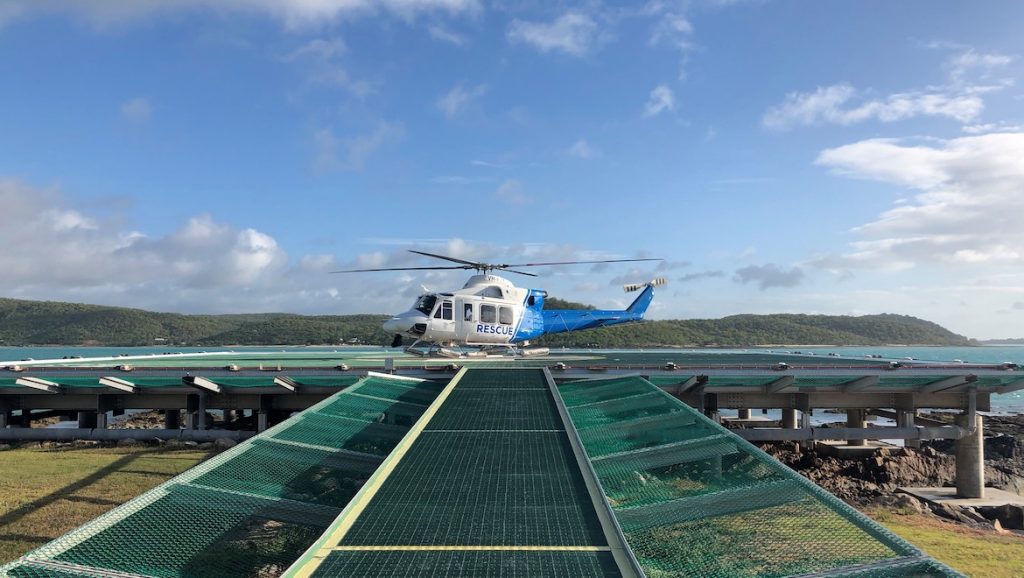
Between the northernmost tip of Queensland and the southern shores of Papua New Guinea lies the Torres Strait – a 151-kilometre-wide strait comprising 274 islands, 17 of which are inhabited and have limited access to emergency medical care.
Thursday Island is the heart of the region’s administrative centre and emergency medical services, and just a stone’s throw away is its entrepôt, Horn Island. From a purpose-built facility at Horn Island Airport, Babcock Australasia provides helicopter emergency medical services (HEMS) to the Torres Strait and Northern Peninsula regions on behalf of Queensland Health, as well as Civil Maritime Surveillance Services on behalf of the Commonwealth government’s Australian Border Force.
Babcock delivers aerial support for emergency medical services (EMS), including hospital transfers, primary medical evacuation and search and rescue (SAR). With transportation to medical facilities in the area being limited, and the nearest hospital located on Thursday Island, Babcock ensures ongoing access to EMS for some of the hardest-to-reach communities.
“Babcock has operated in the remote Torres Strait and Northern Peninsula regions for more than 26 years and has more than 30 personnel employed and trained to meet the high standards required for these mission-critical services,” said Darren Moncrieff, Babcock Australasia’s managing director – aviation and critical services.
“Each year we perform more than 500 life-saving missions, transfer more than 600 patients to hospital, and complete hundreds of surveillance and logistics missions for Australian Border Force.”
Central to these operations are Babcock’s highly skilled pilots, aircrew and engineers, who work as an integrated team with the client’s personnel. This inter-agency collaboration is critical when conducting operations at short notice, day and night, often in challenging weather conditions and involving traumatic circumstances.
Working on the frontline is Babcock Australasia’s senior base pilot, Craig Peters, who holds more than 20 years of local experience.
“In the Torres Strait we experience wide and varied weather, including thunderstorms, rain, and in worse scenarios, cyclones. As a result, weather planning, flying around storms, and limited visibility are some of our biggest challenges,” said Peters.
“The area is made up of a cluster of small islands, therefore most of our operations are over water with limited support from ground assets. Babcock provides specialist aeromedical training to the customers’ paramedics, which enables them to conduct down-the-wire water winch rescue operations in addition to their medical duties.”
The challenges of operating across the Torres Strait extend beyond those posed by the weather and environment. The remote location of Horn Island places heightened emphasis on teamwork, communication, and safety.
“Operating in uncontrolled airspace means there is often limited access to information,” said Peters. “The knowledge and experience of our team in the region ensures that the flight routes are planned and conducted safely and efficiently.”
Babcock’s onsite engineering support carry out scheduled, reactive and preventative maintenance to maximise aircraft availability. “Whether it’s a HEMS, SAR or surveillance mission, time is of the essence, but safety remains our number one priority,” said Peters.
No day is the same for Peters and the Babcock team. “Each task is different and comes with its own unique challenges, but there is great satisfaction to see a job well done,” said Peters. “To safely transport individuals from the outer islands and bring them into the healthcare system is really rewarding and it’s motivating to return to base and know your team has made a difference in the local community.”
Babcock’s expertise, commitment and focus on safe practices in the most challenging of environments continues to save lives and deliver benefit to those living in the remote islands of the Torres Strait.
“The successful delivery of these services would not be possible without the dedication and professionalism of our staff,” said Moncrieff. “Babcock has the right people to deliver these technically-complex, long‑term contracts, both today and in the future, and this is evident in the continued positive feedback we receive from our clients.”
Ensuring patients’ care before flying
In partnership with Queensland Ambulance Service Paramedics, Babcock provides management of the Horn Island Patient Transfer Facility. The facility is used when patients need to spend any time on the ground at Horn Island while awaiting transfers to and from Babcock’s helicopters and the Royal Flying Doctor Services.
This ensures patients are held in a safe and comfortable environment and assists with achieving a better overall patient outcome.
“Safety impacts everything we do. Close enough is not good enough and we need to be on point. It feels good to work in a culture that fosters this attitude and high level of professionalism,” said Andrew Nakata, base manager in Horn Island, Babcock Australasia.














